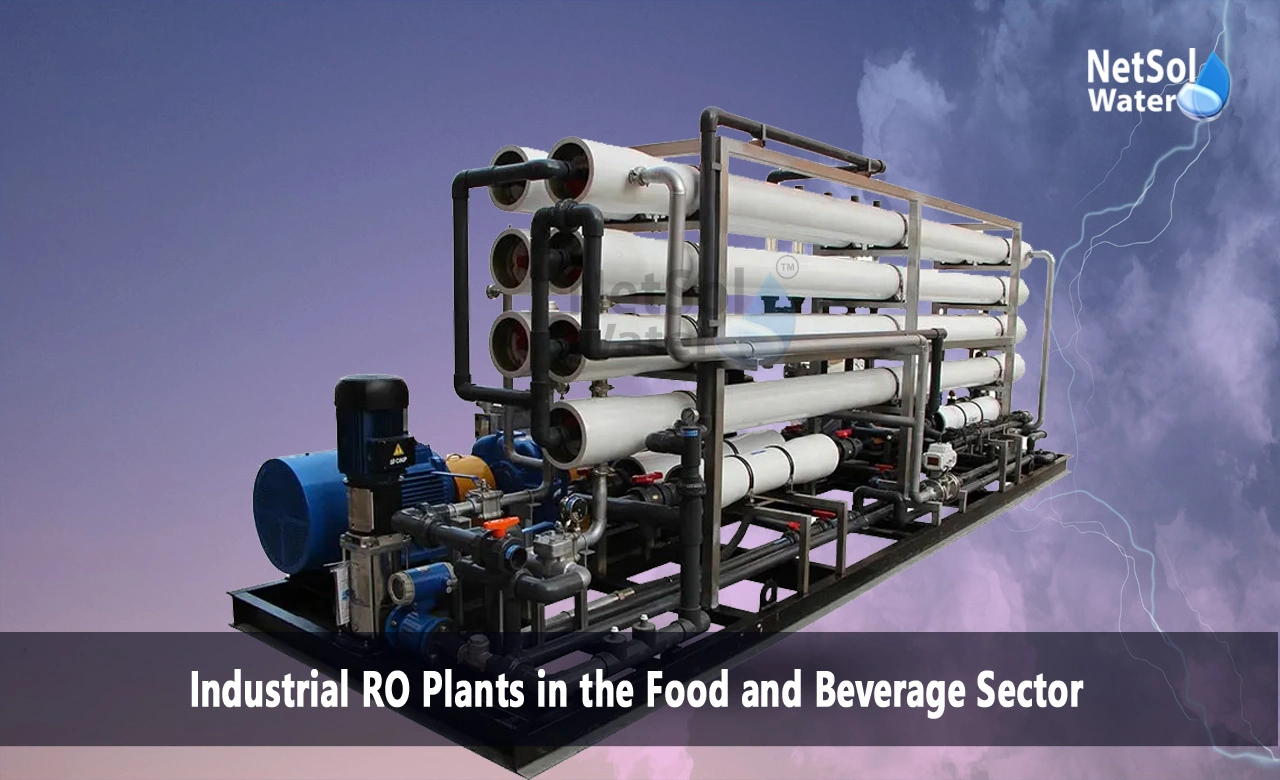Industrial RO Plants in the Food and Beverage Sector
The food and beverage sector meets specific water treatment issues. Clean water serves a key role in making safe high-quality products but traditional filtering methods sometimes fail. Industrial RO plants step in to fill this gap. These innovative technologies employ semi-permeable membranes to take out impurities and generate ultra-pure water at scale. The food and beverage sector now considers RO technology a reliable solution.
What is Reverse Osmosis?
Understanding industrial RO plants needs knowing the basics. Reverse osmosis purifies water by utilizing pressure to drive water molecules through a semi-permeable membrane. This membrane serves as an extremely tiny filter enabling water passage while preventing bigger molecules such dissolved salts, minerals and other pollutants.
The procedure reverses the natural flow of osmosis. Water often travels from places of low solute concentration to high concentration in nature equalizing the system. RO employs pressure to overcome this inclination, driving cleansed water in the opposite direction.
An RO system comprises three main components:
· High-pressure pump
· Semi-permeable membrane
· Pressure vessel
· Spacers and other structural components
The high-pressure pump creates the force needed to propel water through the membrane. As water passes through, impurities remain behind, forming two streams: pure "permeate" water and concentrated "reject" water containing filtered-out toxins.
Benefits for Food and Beverage Production
Industrial RO plants offer numerous important advantages to food and beverage companies:
Consistent Water Quality
RO plants produce reliably pure water by removing up to 99% of dissolved particles, bacteria and other pollutants. This purity level proves critical for ensuring product consistency and quality, especially for beverages. RO guarantees your water meets the highest requirements, whether you create soft beverages, beer or bottled water.
Improved Flavour Profiles
Many dissolved minerals can alter food and beverage taste. RO water removes these components creating a neutral basis that won't interfere with properly developed flavour profiles. This concerns notably for items like beer because water chemistry considerably determines the final taste.
Extended Equipment Life
Hard water minerals can damage processing equipment over time through scale buildup. RO-treated water prevents this issue, increasing the life of expensive technology and lowering maintenance expenses. Heat exchangers, boilers and other water-intensive equipment benefit greatly from this treatment.
Regulatory Compliance
Food safety requirements get increasingly strict. RO plants enable manufacturers meet or beyond water quality standards, assuring compliance with regulatory requirements. This proves important for preventing costly recalls or production shutdowns.
Reduced Chemical Usage
Many food and beverage businesses discover they may lower their chemical treatment use with fewer water contaminants. This saves money and fits with growing consumer desire for products with fewer ingredients.
Types of Industrial RO Plants
The food and beverage industry uses various specific RO configurations:
Single-Pass RO Plants
These represent the most basic arrangement. Water travels through the RO membrane once, creating permeate and concentrate streams. Single-pass systems frequently serve for general production processes.
Double-Pass RO Plants
Applications requiring ultra-pure water use double-pass systems, which send the permeate from the first stage through a second RO process. This achieves even greater purification levels, excellent for sensitive items.
Brackish Water RO Plants
These systems manage water with moderate dissolved solids levels (1000-10000 mg/L) and find regular use in inland locations with mildly salty groundwater.
Seawater RO Plants
Coastal regions with limited freshwater sources use these heavy-duty systems capable of desalinating ocean water. They require specialist high-pressure pumps and corrosion-resistant materials.
Integrating RO Plants into Food and Beverage Operations
Implementing an industrial RO plant involves careful planning and integration with existing processes. Consider these crucial factors:
Pre-treatment Requirements
RO membranes demonstrate susceptibility to specific pollutants. Most systems need pre-treatment activities like sediment filtration, carbon filtering and water softening to protect the membranes and maximize performance.
Energy Efficiency
RO plants can consume tremendous energy. Modern facilities contain energy recovery devices that absorb hydraulic energy from the concentrate stream, reducing overall power consumption.
Membrane Maintenance
Regular cleaning and replacement of RO membranes guarantees system efficiency. Food and beverage firms must factor in these maintenance requirements when building their water treatment processes.
Concentrate Management
Proper management of the concentrated reject water from RO plants is critical. Depending on local legislation and environmental considerations, this may involve treatment for reuse or safe disposal.
Automation and Monitoring
Advanced RO plants incorporate sophisticated control systems to monitor water quality, change operational parameters and notify operators about any hazards. This assures consistent performance and lowers unexpected downtime risk.
Industry-Specific Applications
Different areas within the food and beverage industry exploit RO technology in different ways:
Beverage Production
Soft drink manufacturers employ RO water as a foundation for their goods maintaining consistent flavour and quality across production batches. Bottled water businesses often combine RO with other treatments to achieve specific mineral profiles.
Brewing and Distilling
Craft breweries and distilleries employ RO to provide a blank slate for their water providing exact control over mineral concentration. This proves especially helpful for reproducing specific regional water profiles associated with classic beer styles.
Dairy Processing
The dairy industry employs RO for concentrating milk and whey products. Processors can cut transportation costs and develop value-added components like whey protein concentrates by eliminating water content.
Fruit and Vegetable Processing
RO plants can remove pesticides and other impurities from wash water used in vegetable processing. This enhances food safety and extends the shelf life of fresh-cut fruits and vegetables.
Conclusion:
Industrial RO plants have become an important technology for the food and beverage industries. These systems deliver dependably pure water enabling firms to make high-quality products, satisfy regulatory standards and operate more effectively. As technology improves RO will play an increasingly essential role in sustainable water management for food and beverage manufacturing.
To explore customised commercial RO plants, Industrial RO plants, ETP or STP solutions for your needs in your areas and nearby regions, contact Netsol Water at:
Phone: +91-965-060-8473, Email: enquiry@netsolwater.com



